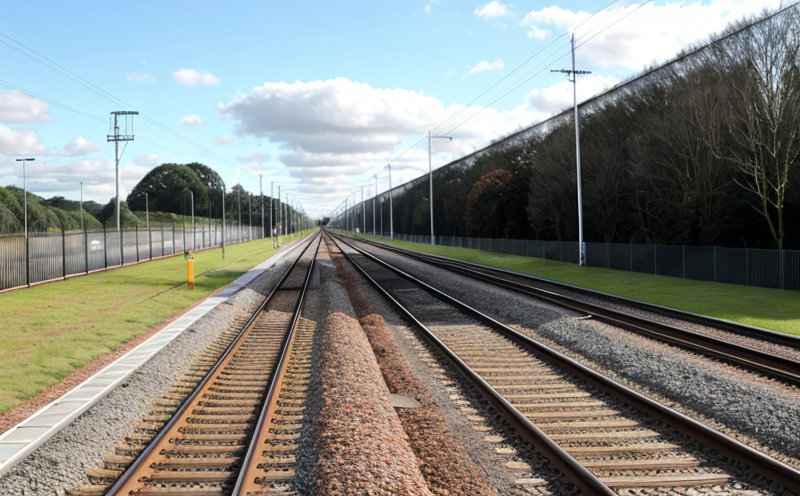EN 13481-4 Long-Term Fatigue of Track Fasteners
The European Standard EN 13481-4 is a critical document in railway and transportation testing, specifically addressing the long-term fatigue behavior of track fasteners. This standard ensures that the design, manufacturing, and maintenance processes for track fasteners meet stringent durability requirements to prevent failures over extended operational lifetimes.
Track fasteners are essential components in rail infrastructure, providing stability and alignment between sleepers and rails. The stress from wheel loads, thermal expansion, and environmental conditions can lead to fatigue cracks developing over time. Fatigue failure of these fasteners could result in derailments or severe track damage, posing significant safety risks.
The testing protocol outlined in EN 13481-4 focuses on simulating the dynamic loading conditions that a fastener experiences during its operational life. This involves subjecting the fastener to repeated stress cycles until it reaches its fatigue limit. The standard specifies detailed procedures for specimen preparation, test setup, and data analysis.
Preparation of specimens is critical in EN 13481-4. The fasteners are typically mounted on a specially designed fixture that mimics real-world loading conditions. The test rig applies forces similar to those encountered by the fastener during train passage, including vertical loads, lateral forces, and twisting moments.
The testing procedure itself is highly standardized. A specified number of fatigue cycles are applied to each specimen until it either fails or meets predefined criteria indicating sufficient durability. The standard defines acceptance criteria based on structural integrity and performance under stress. Any specimen that shows signs of fatigue failure before reaching the required cycle count must be rejected.
Once testing is complete, comprehensive reports are generated detailing the test parameters, cycles applied, and any observed failures. These reports serve as crucial documentation for quality assurance processes and compliance with regulatory standards.
The importance of EN 13481-4 cannot be overstated in ensuring the reliability and safety of rail infrastructure. By adhering to this standard, railway operators and manufacturers can confidently deploy fasteners that will withstand the rigors of continuous use without compromising on performance or safety.
Why It Matters
The long-term fatigue testing of track fasteners is vital for maintaining robust rail infrastructure. Railways are exposed to a wide range of environmental stresses and dynamic loading conditions, which can lead to premature failure if not properly engineered and tested. Ensuring that the fasteners meet EN 13481-4 standards helps prevent costly disruptions due to failures and enhances overall safety.
The reliability of track fasteners directly impacts passenger and cargo transport efficiency. Failures in these components can result in service interruptions, delays, and increased maintenance costs. By adhering to this standard, railway operators can maintain uninterrupted service, thereby enhancing customer satisfaction and operational efficiency.
Moreover, compliance with EN 13481-4 is a critical factor for manufacturers seeking to enter the global market. Many countries have adopted this standard as part of their regulatory frameworks, making it essential for exporters to ensure their products meet these stringent requirements.
In summary, the testing protocol in EN 13481-4 plays a crucial role in safeguarding rail infrastructure and promoting safe, reliable transportation systems. It is an indispensable tool for ensuring that track fasteners can withstand the challenges of real-world use over extended periods.
Customer Impact and Satisfaction
The implementation of EN 13481-4 testing has a significant impact on customer satisfaction within the railway industry. By adhering to this standard, manufacturers produce high-quality track fasteners that are reliable and durable. This leads to fewer failures in service, reducing the need for emergency repairs and maintenance.
Railway operators benefit from enhanced safety and operational reliability when using EN 13481-4 compliant fasteners. Reduced downtime translates into lower operational costs and improved service quality. Passengers experience more reliable travel schedules, which contributes positively to overall customer satisfaction.
For procurement teams involved in selecting suppliers for rail infrastructure projects, compliance with EN 13481-4 is a key criterion. This ensures that the fasteners meet rigorous standards, providing peace of mind and confidence in supplier reliability.
In summary, the long-term fatigue testing protocol specified by EN 13481-4 contributes directly to enhanced customer satisfaction by ensuring the quality and safety of track fasteners used in railway infrastructure.
Competitive Advantage and Market Impact
- Enhanced Safety and Reliability: Compliance with EN 13481-4 provides a competitive edge by ensuring that products meet the highest safety standards, thereby reducing the risk of failures.
- Increased Customer Trust: Demonstrating adherence to this standard builds trust among railway operators and other stakeholders, enhancing brand reputation.
- Easier Market Access: Many international markets require compliance with EN 13481-4 for rail infrastructure components. Being able to demonstrate this can open up new market opportunities for manufacturers.
- Operational Efficiency: By reducing the need for maintenance and repairs, compliant products contribute to greater operational efficiency, which is a key factor in competitive advantage.
The standard also fosters innovation by encouraging continuous improvement in materials and manufacturing processes. This not only meets but exceeds regulatory requirements, providing an additional layer of assurance that can be marketed as a selling point.
In the broader market context, compliance with EN 13481-4 is seen as a benchmark for quality and reliability. It positions companies at the forefront of technological advancements in rail infrastructure components, contributing to their competitive position in both domestic and international markets.





